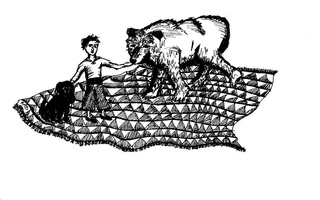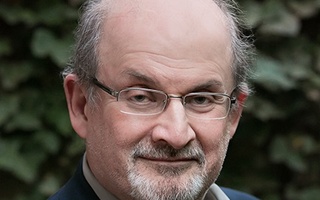{shortcode-1127317ae07bc9f45f26f2a673418fcba894837c}
British Indian author Sir Salman Rushdie has had a matchless career. Adored by fans and respected by reviewers, the author of “Midnight’s Children” and “The Satanic Verses” has received that combination of popular and critical acclaim that is increasingly rare as the cultural and literary landscape fragments into smaller and smaller factions. Together with the assassination attempts and the murder of a number of his literary associates, this success might tempt another author to retire from public life. Rushdie, however, is still very much in the game: This month saw the release of “Two Years Eight Months and Twenty-Eight Nights,” his first adult novel in nearly a decade and the focus of a recent reading at the Harvard Book Store. Prior to his talk, he spoke candidly with The Harvard Crimson.
“It’s kind of the wildest book I’ve written in a long time,” Rushdie says. The book’s action looks at a New York very similar to our own, but one in which an enormous storm has blown away the barriers between the ordinary world and the world of the jinns and devs, supernatural beings of Middle Eastern mythology, who promptly set about causing problems for human beings.
“It’s the most extreme version of the literature of the fantastic that I’ve attempted,” he says. “I think if you’re going to write a book of this type—if you’re going to use the fantastic—the reason for doing it is to say something about the world as it is…. I wanted to convey a sense of people feeling somehow the familiar has been dislocated and the unfamiliar rules, and it’s as if the rules of the game have changed and people don’t know what the new rules are.”
Rushdie regards this project as cutting against the grain of the current literary establishment. “It’s strange because right now there is a great literary vogue for the opposite of this, for books that are hypernaturalistic and which appear to draw very directly on the personal circumstances of the writer,” he says. “And that seems to be where a lot of readers have been drawn lately, this very intimate sort of material, which is the opposite of public fiction, and is certainly the opposite of the kind of surrealism in this book.”
Despite Rushdie’s decision to draw on the fantastic, the book is not entirely devoid of the author’s reality. In choosing New York for the book’s setting, Rushdie devotes loving attention to the city in which he has lived since 2000 while still maintaining a common thread with his earlier work and lived experiences. “I find [New York] oddly familiar, because it in many ways it reminds me of the city of Bombay where I grew up,” he says. “Even physically, Manhattan Island and downtown Bombay are about the same shape and size and have the same crowded population and atmosphere.”
Rushdie feels that “Two Years Eight Months and Twenty Eight Nights” stands at a particular developmental junction in his oeuvre. “I started out trying to make sense of where I’d come from—India and Pakistan—and then I began to feel that, because of my life being spent traveling between many countries, certain subjects naturally presented themselves to me, one of which was migration, another of which was just the question of how, in this shrinking world, the world joins up—how one part of the world affects another part of the world,” he says.
The author’s interest in the interactions between diverse and conflicting systems of thought does not end with his fiction but extends to his opinions about the current intellectual climate of the West. “One of the things that worries me a great deal about the academy is the rise of political correctness and the things like trigger warnings and just the growth among students of the idea that the university is a place where you should be protected from ideas that you don’t like, whereas it used to be that the university was precisely the place where your own thoughts and ideas should be challenged—otherwise, why go?,” he says. “The idea that students have a right to be protected from things that might upset them is, to my mind, the antithesis of what universities should be trying to do, because at universities it should be the ideas themselves that are protected, not the students from them. And I really worry about this curious, militant conservatism which allows some students to think that they must protect themselves against new things.”
It is perhaps this relentless spirit of unfettered inquiry and creativity that is the main underpinning of Rushdie’s artistic and intellectual program. “There is a suspicion around these days about fiction. There’s an atmosphere even among serious readers which suggests that nonfiction or this very autobiographical nonfictional fiction somehow tells more truth than highly fictive fiction. And I would just like to suggest to people that they pick more widely than that. Because of course naturalism is one very important way to tell the truth, but it is only one way,” he says. “I guess I’m just encouraging people to be a little more radical in the way they read.”—Staff writer Jude D. Russo can be reached at jude.russo@thecrimson.com.
Read more in Arts
Chvrches Continues Synth-Pop Reign on 'Every Open Eye'Recommended Articles
-
The Long Journey HomeJohn L. Ashbery ’49, Jamaica Kincaid and Salman Rushdie, three of the greatest writers of our time, shared the stage
-
 Rushdie Rekindles Old Myths in ‘Fire of Life’
Rushdie Rekindles Old Myths in ‘Fire of Life’ -
 10 Remarks by Salman Rushdie
10 Remarks by Salman Rushdie -
Salman Rushdie at the Boston Book FestivalWhile the discussion was framed around Rushdie’s newest work, “Joseph Anton: A Memoir,” it also touched on his time in hiding, his continuing evolution as a writer, and his thoughts on the religious extremism that almost claimed his life
-
 Salman Rushdie Presents 13th Novel, ‘The Golden House’
Salman Rushdie Presents 13th Novel, ‘The Golden House’













